TOP 9 PHP FRAMEWORKS IN 2019: WHAT, WHY, WHEN AND WHICH?
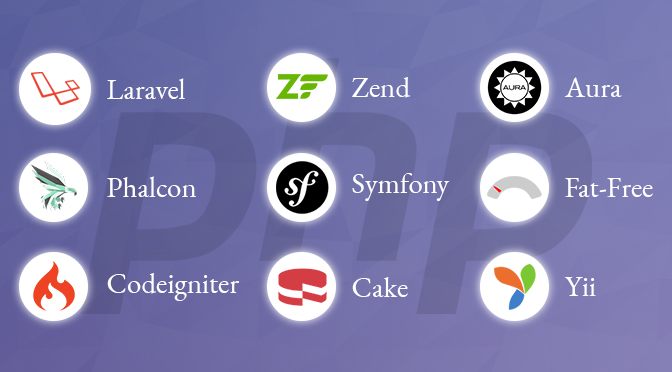
Table of Contents
Having a State-of-the-art website as the face for your business is a must to depict in front of the world. And to achieve that, it is important to choose the right set of tools and framework and PHP might be the right path for you.
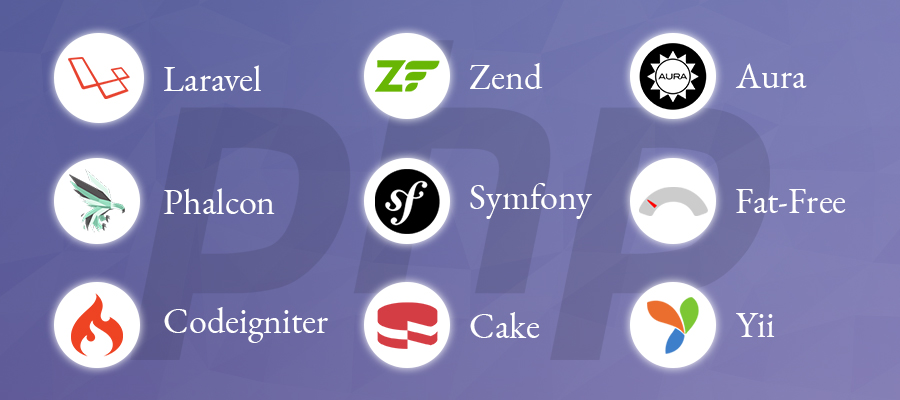
PHP is powerful and most widely used server-side scripting language – almost 80% of the websites run on it.
This article discusses PHP Framework and enlists the top 9 PHP frameworks for enterprises.
Jump to your favourite topic
What is a PHP Framework?
PHP – Hypertext Pre-Processor is a widely used server-side scripting language used to develop web apps. It gained its popularity with features like open-source, flexibility, efficiency, ease-of-use and many more.
Back when PHP or any other technology kicked-off, the developers used to write their own custom code for every functionality. Later, a few people realized that writing the same code every time again and again, on every page, and not reusing it extensively was not that effective. So, with the launch of PHP 5, and the feature of PHP Object Model, is really when PHP Frameworks came into the picture.
(adsbygoogle = window.adsbygoogle || []).push({});
A PHP Framework is a universal, reusable software platform that provides us a structure to develop web applications. One can also say that it is a library or software that aids the developers with a basic code base and provides a standard structure to streamline the development of web applications.
This helps to promote Rapid Application Development (RAD) which saves time, reduces the number of repetitive coding and helps in faster application development. This leads to developers being able to give more time on the actual application.
PHP Frameworks also takes care of the connection between the database and the application you’re developing so one does not need to worry about manually handling that stuff. It also benefits the developers to give ample amount of time on creating the application instead of wasting time in writing repetitive reusable code.
Working on a PHP Framework can be a great head-start for the beginners to develop stable & feasible web applications ensuring a proper database interaction and a benefit to code on the presentation layer.
Why use a PHP Framework?
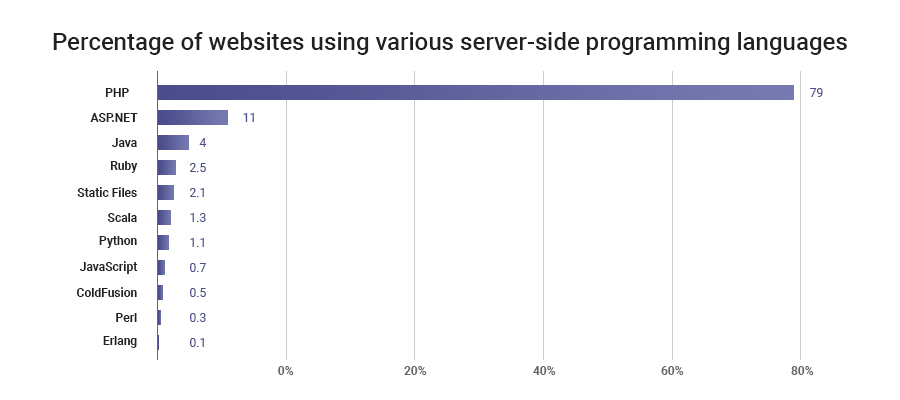
PHP Frameworks have various reasons to be implemented by the developers, the major reason for choosing PHP Frameworks is because they speed up the process of web development with stability enhancements.
This is done by reusing the code within the similar projects which saves the time and efforts of the developers. This time and efforts can be utilized by the developers in developing the real application as PHP Frameworks provide inbuilt modules to perform tedious coding tasks.
Simplicity might have been one of PHP’s biggest attraction and also be the reason for developers in choosing this scripting language, but it might be the major reason for its downfall.
The newbies on the frameworks do create powerful web applications, but they write bad code without even realizing which may lead to an open gateway for security breachers to attack. No doubt the application will still work, but it remains insecure.
One should keep it in mind to make sure everything is right while working with a forgiving language, even though your application runs smoothly.

Alas, there are numerous PHP Frameworks available in the market to choose from. Also, one can also create their own PHP Framework, still the majority of developers prefer to select from the top and renowned PHP Frameworks for their popularity, community support, and interaction with the developers using that same PHP Framework.
So before selecting a PHP Framework, you should take a moment, look at your project requirements, and decide if you want to use a PHP Framework or not. And it should depend on if it saves your time & efforts for that project improves performance and stability. If yes, then using a PHP Framework would befit your project.
When to use a PHP Framework?
While deciding if you want to use a PHP Framework or not, this is the first question that occurs in the mind. It takes different perspectives to answer this question. Many novice developers might find a PHP Framework convenient for their project as it helps in reducing improper coding and increase the development with features like simplicity and stability.
Whereas several adroit PHP Developers consider PHP Frameworks to be just a mere tool for the developers who don’t write code in a clean, efficient manner. This might sound a bit inane, but to address the elephant in the room, PHP Frameworks do help to save time and provide efficiency to the code.
Working with a PHP Framework while developing a project with tight deadlines can be a great benefit as a PHP Frameworks speed up the coding process immensely. PHP Frameworks can also be beneficial if you’re working on a project having loads of monotonous coding, as it can help to keep the task less boring. These are few of the many points that one should consider knowing when to use a PHP Framework for their project.
Which PHP Framework to use?
With the rise in popularity of PHP Frameworks, developers started to build their own PHP Frameworks with numerous functionalities. This leads to selecting the right PHP Framework which is apt for your requirements.
So let us dive into the top PHP frameworks enlisted below without further ado.
Also, do take note that the list here is in no particular sequence and you may choose the right PHP Framework as per your need.
| Framework | Release | Learning Curve | PHP Version Required |
| Laravel | 2011 | Easy | 5.5.9 |
| Yii | 2010 | Moderate | 5.1 |
| Symfony | 2005 | Difficult | 5.5.9 |
| Phalcon | 2012 | Moderate | 5.3 |
| CodeIgnitor | 2006 | Easy | 5.4 |
| Zend | 2006 | Difficult | 5.3 |
| CakePHP | 2005 | Moderate | 5.5.9 |
| Aura | 2012 | Difficult | 5.4 |
| FatFree | 2013 | Easy | 5.3 |
1. Laravel
Laravel is an open-source, all-inclusive PHP Framework which gained its popularity since 2015. Introduced in 2011, Laravel is used in developing web applications and follows the Model-View-Controller (MVC) architecture. The reason behind its increased popularity is that it is built for rapid development.
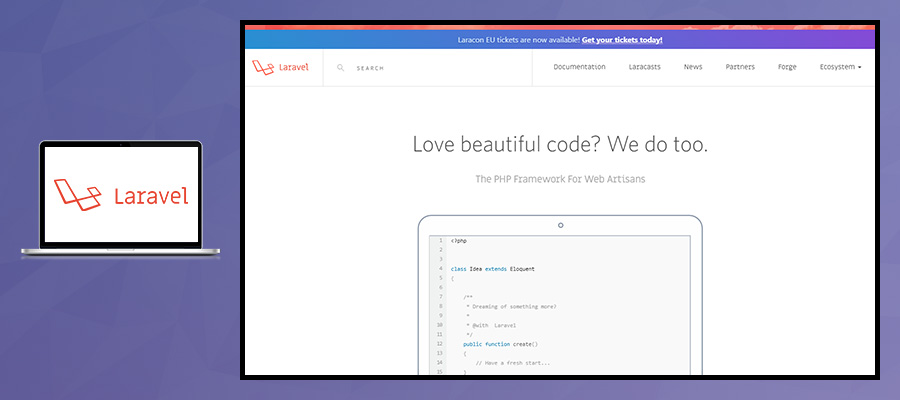
The framework has been developed in such a way that its well-built templating engine enables a wide array of regular tasks like RESTful routing, caching, user management, and authentification which makes it easier for the developers in creating web applications.
Pure syntax, being able to run tasks asynchronously in the background to increase the performance and well-established integration with Amazon Web Services (AWS) increment to the features that make Laravel a great choice for PHP Framework.
If Laravel is the perfect fit for your project, then you might have arrived at the right destination. We at Magneto IT Solutions house some of the best Laravel Developers to provide immense Laravel Development Services.
Website: https://laravel.com/
2. Yii
Yii, which is an abbreviation for ‘Yes, it is!’, is as simple as it sounds. The second version of the YII PHP Framework maintains simplicity and uses a different loading technique that outperforms the other PHP Frameworks. Yii 2 is an object-oriented framework and is based on a non-repetitive principle which avoids the use of similar software patterns repeatedly.
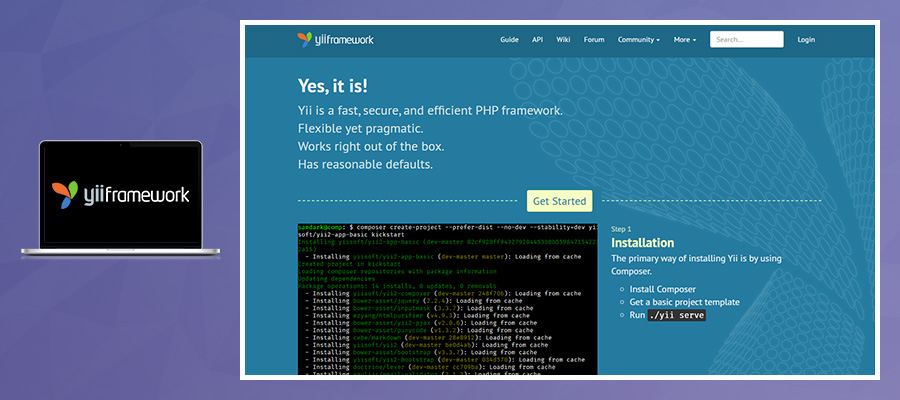
Yii is Integrated with features from Ajax and JQuery, making it a go-to option for large scale projects of web application development. Another big benefit of Yii 2 is its class code generator that propels object-oriented programming and rapid prototyping.
If you feel that Yii Framework might be the right PHP Framework according to your project requirements, then feel free to contact us. We at Magneto IT Solutions provide best Yii Development Services with the adroit and experienced Yii Developers who deliver exactly what you ask for.
Website: https://www.yiiframework.com/
3. Symfony
Created in 2015, Symphony is a PHP Framework that offers the developers with reusable components and code along with in-built functionality for testing. PHP Developers can utilize several Symfony components to choose from, depending on their project requirements. As for those, Symfony is one of the best PHP frameworks for big enterprise software development applications.
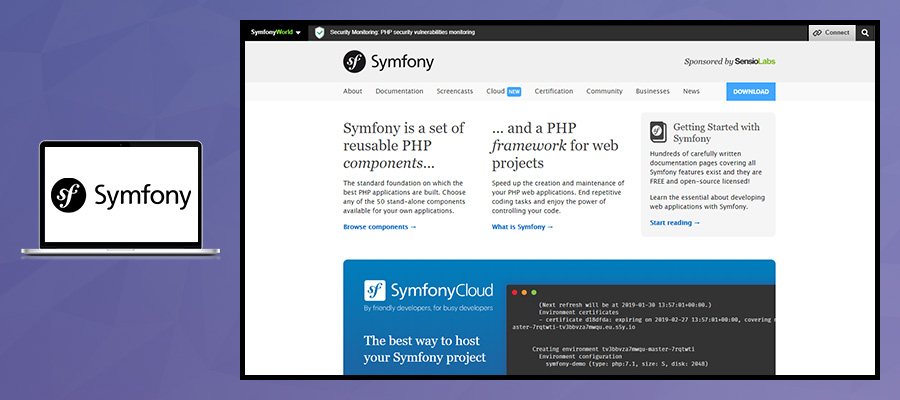
Symphony’s extensive ecosystem is continuously supported by a vast community of PHP developers. The framework offers comprehensive technical documentation to ease the learning curve, making it rather steep for the developers unfamiliar with the framework. All they would need is time and effort to pursue it. Symphony is the top option if the project you’re working on relies on modularity.
Website: https://symfony.com/
4. Phalcon
Released in 2012, Phalcon PHP Framework has been written in C, which makes it an extension of PHP in C language. Phalcon provides increased speed and performance, making it widely popular among the top PHP Frameworks.
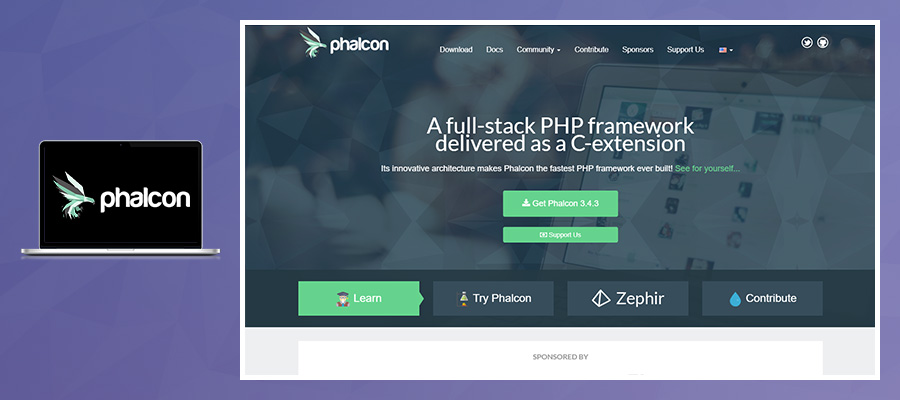
Phalcon follows the MVC pattern when it comes to architecture. Phalcon PHP Framework is light on resources, making sure the developers working on the framework can add libraries and components as per the requirement arises. This ensures a smooth, comfortable and tidy development process.
Website: https://phalconphp.com/
(adsbygoogle = window.adsbygoogle || []).push({});
5. CodeIgniter
Initially launched in 2006, CodeIgniter is a powerful PHP Framework with the least footprint. CodeIgniter is specially built for the developers who want a simple and elegant toolkit for developing a complete feature-rich web application. It is a simple PHP framework that requires minimum to no setup and configuration from the developers.
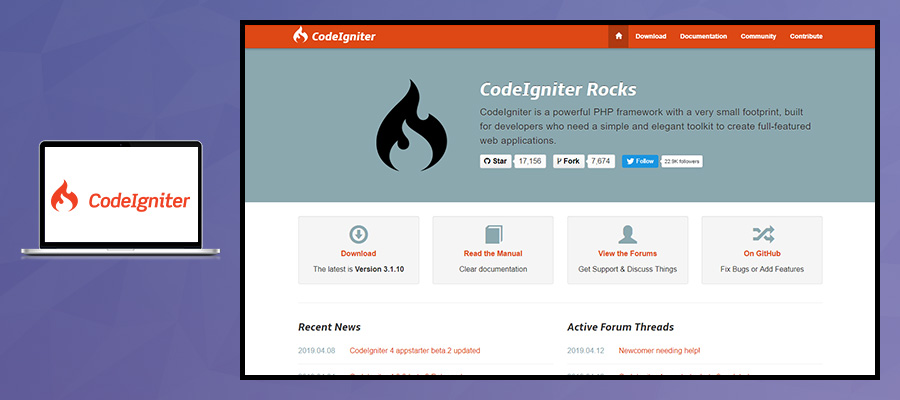
CodeIgniter partially works on the MVC architectural pattern, but not entirely. The Controller is mandatory whereas the Model and View classes are optional.
CodeIgniter works like charm with the database tasks, making the performance speedy. With these and many more benefits, still, this PHP Framework has an easy learning curve for the beginners.
Website: https://codeigniter.com/
6. Zend
Zend Framework is one of the best PHP frameworks available with the aim of large-scale enterprise projects. There are numerous benefits like support for the agile methodology, allowing the developers to develop and deliver high-quality web applications to big companies. Also, its architecture allows developers to mainly focus on their selected components which allow the developers working with the Zend Framework to reuse a lot of code.
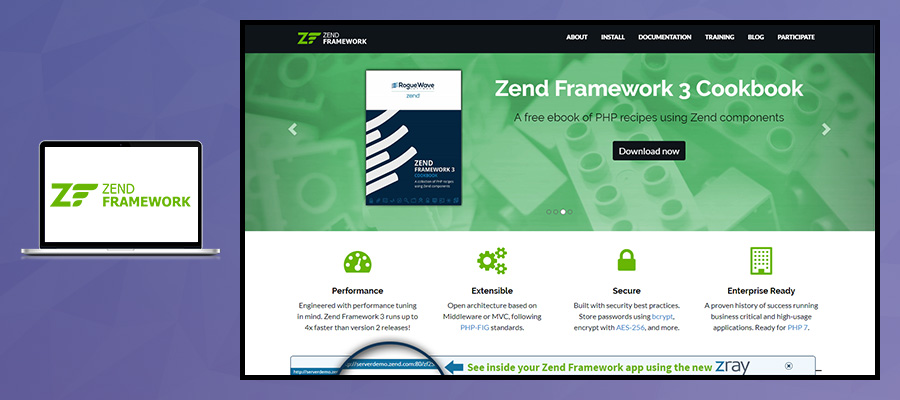
Major featural benefits of Zend:
-
Scalability
-
Extensibility: easy integration with external libraries
-
Cryptographic coding tools
-
Drag-and-drop editor
-
Instant online debugging tools.
These are just a few of many features of Zend, which solidifies it to be one of the top PHP frameworks for 2019. Still, this framework has the most difficult learning curve of all the PHP frameworks and needs ample efforts to master it.
Website: https://framework.zend.com/
7. CakePHP
CakePHP, released in the early 2000s, the framework is still being updated and improvised regularly at a consistent pace to make it faster and better for the developers by its community.
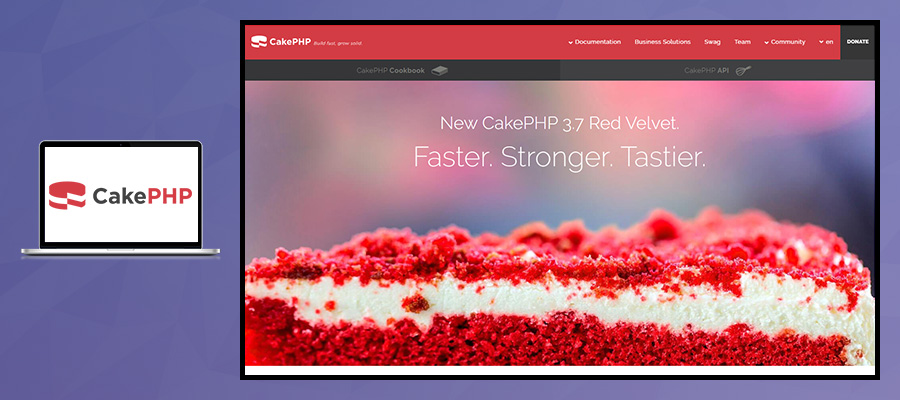
CakePHP is one of the best PHP Frameworks to create beautiful, feature-rich web applications in 2019, allowing faster builds and proper class validation. CakePHP is built upon the CRUD Framework (Create-Read-Update-Delete) making it the easiest of all PHP Frameworks. The functionality for security has been specially worked on, with features like SQL injection prevention, cross-site request forgery, input validation, and cross-site scripting protection. The CakePHP community offers free and premium support to the developers.
Website: https://cakephp.org/
8. Aura
Aura is used for developing basic web applications. It is a set of disassociated libraries which are self-contained, have no dependencies, and every library can be integrated separately with any project. Aura community regularly supports the libraries and are maintained by them.
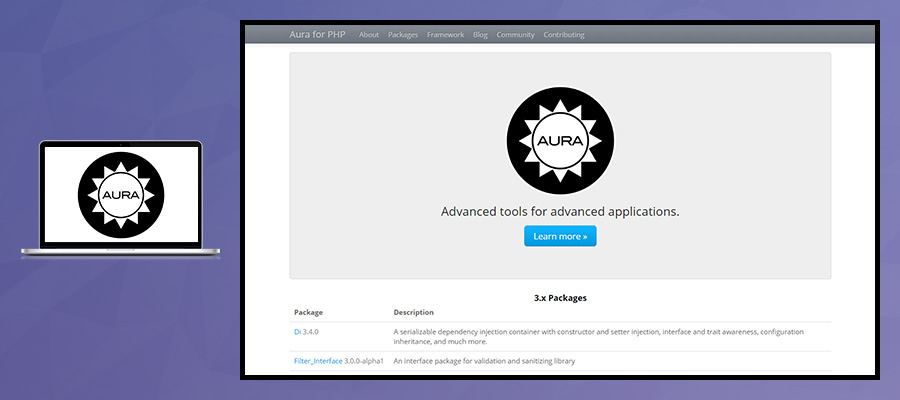
Top Features of CakePHP include:
-
Configuration system
-
Dependency injection container
-
CLI dispatcher
-
Web request and response objects
-
Logging instance
-
Standard I/O objects
Website: http://auraphp.com/
9. FatFree
Despite being a micro framework, Fat-Free still packs-in so many features that it can be considered closer to Laravel in the line. These features are namely unit testing, image processing, data validation, and many more.
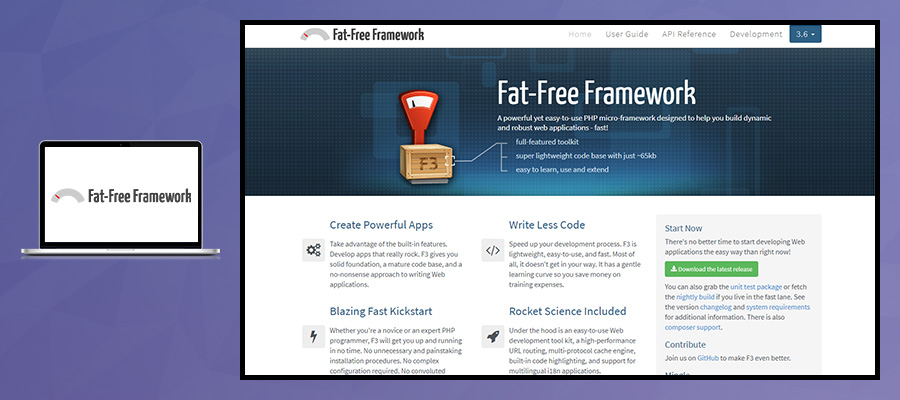
This framework also supports SQL and NoSQL databases making it easy to develop powerful web applications. Fat-Free is one of the best PHP Frameworks in spite of having too many features for a PHP Microframework. The developers can still utilize the full-stack option to avail all the benefits from it.
Website: https://fatfreeframework.com/
To Conclude
PHP Frameworks ensure to reduce the need for reusing same code again and again, ensures clean and maintainable code and boosts the development speed in creating web applications. This is a great way for developers from no experience to expert PHP developers in creating a feature-rich web application which is highly secured reducing the risks in your application.
While many PHP developers don’t consider using the PHP Frameworks to create web applications, these frameworks can still be a huge advantage in situations where rapid application development is necessary with priority deadlines. And for developers from beginner to Moderate4 skillset in PHP development, PHP frameworks can boost their process of grasping PHP while implementing better coding practices which in return reduces bad coding, a common practice of forgiving nature in PHP programming language.
There are a number of PHP frameworks available in the market today, hence finding a framework that fits the needs of the PHP developers in terms of features, support, speed, scalability and more is a must.
#toc_container {
margin: 50px auto;
background: transparent;
border: 4px solid #aaa;
padding: 0 40px 40px 40px;
width: auto;
display: table;
font-size: 95%;
}
#toc_container p.toc_title {
background-color: #ccc;
position: relative;
max-width: fit-content;
text-align: center;
font-weight: 500;
margin: -19px auto 30px auto;
padding: 0 15px;
margin-bottom: 15px;
height: 32px;
}
#toc_container p.toc_title:before {
right: 100%;
border-left: 1rem solid #fff;
}
#toc_container p.toc_title:after, #toc_container p.toc_title:before {
border-top: 1rem solid #ccc;
border-bottom: 1rem solid #ccc;
content: “”;
position: absolute;
top: 0;
bottom: 0;
width: 0;
height: 0;
}
#toc_container p.toc_title:after {
left: 100%;
border-right: 1rem solid #fff;
}
#toc_container.no_bullets li:before {
content: “”;
border-top: 1px dashed #ccc;
display: block;
position: absolute;
top: 21px;
width: 100%;
z-index: 1;
}
#toc_container a {
background-color: #fff;
z-index: 2;
position: relative;
padding-right: 10px;
color: #269a83 !important;
}
.toc_number {
float: right;
color: #aaa;
padding: 0 0 0 10px;
background-color: #fff;
display: block;
z-index: 2;
position: relative;
}
#toc_container.no_bullets li, #toc_container.no_bullets ul, #toc_container.no_bullets ul li, .toc_widget_list.no_bullets, .toc_widget_list.no_bullets li {
background: 0 0;
list-style-type: none;
list-style: none;
position: relative;
margin-left:0;
}
#toc_container.no_bullets li:before {
content: “”;
border-top: 1px dashed #ccc;
display: block;
position: absolute;
top: 21px;
width: 100%;
z-index: 1;
}
#toc_container a {
background-color: #fff;
z-index: 2;
position: relative;
padding-right: 10px;
}
.toc_number {
float: right;
color: #aaa;
padding: 0 0 0 10px;
background-color: #fff;
display: block;
z-index: 2;
position: relative;
}


